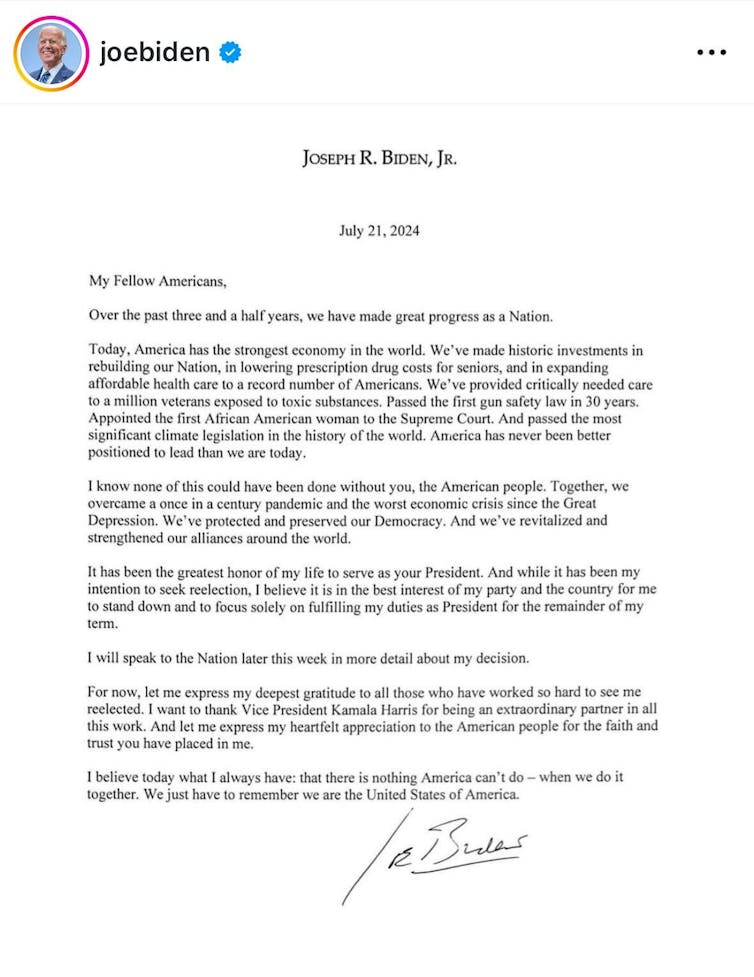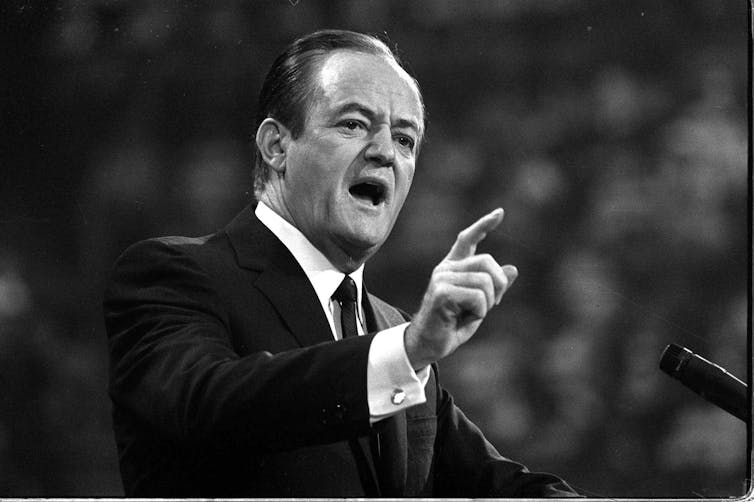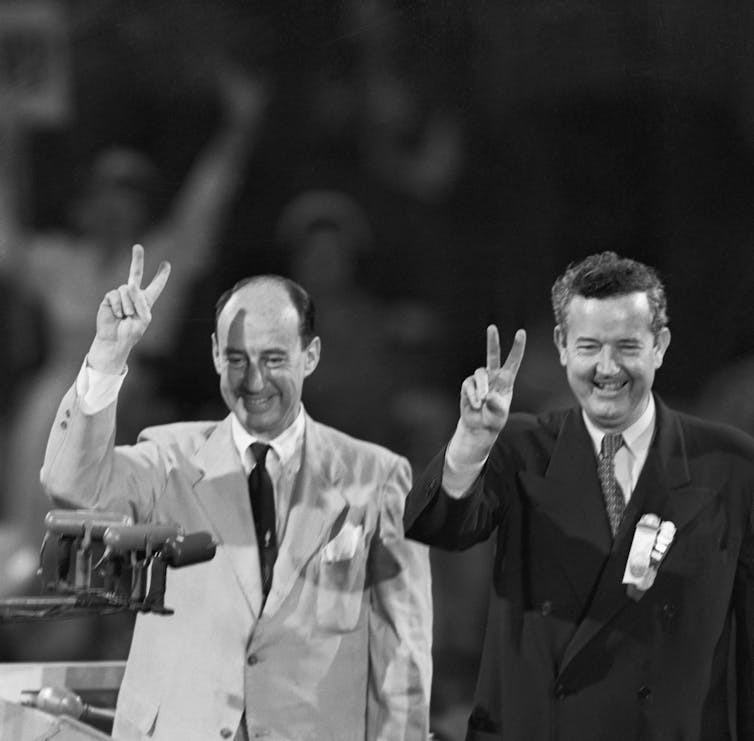By Philip Klinkner*
Now that Joe Biden has dropped out of the 2024 presidential race and endorsed Vice President Kamala Harris to be the nominee, it will ultimately be up to Democratic National Convention delegates to formally select a new nominee for their party. This will mark the first time in over 50 years that a major party nominee was selected outside of the democratic process of primaries and caucuses.
Many Democrats had already begun discussing how to replace Biden. They worried that having the convention delegates, the majority of whom were pledged at first to Biden, select the nominee would appear undemocratic and illegitimate.
The Republican Speaker of the House has claimed that having the convention replace Biden would be “wrong” and “unlawful.” Others have conjured up the image of the return of the “smoke-filled room.” This term was coined in 1920 when Republican party leaders gathered in secret in Chicago’s Blackstone Hotel and agreed to nominate Warren G. Harding, a previously obscure and undistinguished U.S. senator from Ohio, for the presidency. He won that year, becoming a terrible president.

The tradition of picking a nominee through primaries and caucuses – and not through what is called the “convention system” – is relatively recent. In 1968, after President Lyndon B. Johnson announced he would not run for reelection, his vice president, Hubert Humphrey, was able to secure the Democratic nomination despite not entering any primaries or caucuses. Humphrey won because he had the backing of party leaders like Chicago Mayor Richard Daley, and these party leaders controlled the vast majority of the delegates.
Many Democrats saw this process as fundamentally undemocratic, so the party instituted a series of reforms that opened up the process by requiring delegates to be selected in primaries or caucuses that gave ordinary party members the opportunity to make that choice. The Republican Party quickly followed suit, and since 1972 both parties have nominated candidates in this way.

Some Democrats are worried that a new nominee, selected by the convention, will, like Humphrey, lack legitimacy since she or he will have secured the nomination without direct input from Democratic voters around the country.
In response, they’ve suggested what’s being called a “blitz primary” in which Democratic voters will decide on a nominee after a series of televised candidate town halls hosted by politicians and celebrities like Barack and Michelle Obama, Bill and Hillary Clinton, Oprah Winfrey and Taylor Swift.
From the perspective of a scholar who studies political parties and elections, this proposal seems like wishful thinking since there’s no mechanism for setting up a workable election process in such a short period of time. The usual process of primaries and caucuses takes months, if not years, of preparation.
Some good picks in the past
While many associate the convention system with less than impressive nominees, like Harding, the record isn’t that bad.
At the very first convention, held by the National Republicans – ancestors of today’s Republican Party – party leaders and insiders nominated Henry Clay for president. Although Clay lost to Andrew Jackson the following year, he is considered one of the greatest politicians of the 19th century.
The convention system in both parties went on to nominate Abraham Lincoln, Ulysses S. Grant, Woodrow Wilson, Franklin D. Roosevelt, Dwight D. Eisenhower and John F. Kennedy, all of whom were elected president. Of course, conventions also nominated lesser figures like Horatio Seymour, Alton Parker and John W. Davis.
But who’s to say that the current system has done any better to produce electable candidates?
Yes, there’s Ronald Reagan and Barack Obama, but there have also been less successful candidates like George McGovern, and weaker presidents like Jimmy Carter and George W. Bush.
Furthermore, had the old system been in place this year, there’s a chance that the Democrats might have avoided their current predicament.

A way to avert trouble
To the extent that Democratic Party leaders were aware of Biden’s decline, they might have been able to ease him out in favor of a better candidate – if they had been in control of the nominating process. In fact, party leaders in previous decades often knew more about the candidates than the public at large and could exercise veto power over anyone they thought had serious vulnerabilities.
For example, in 1952, U.S. Sen. Estes Kefauver of Tennessee came into the Democratic National Convention the clear favorite in party-member polls. He also won the most primaries and had the most delegates.
Party leaders, however, had serious reservations about Kefauver since they considered him too much of a maverick who might alienate key Democratic constituencies. The party bosses also knew that Kefauver had problems with alcohol and extramarital affairs.
As a result, party leaders coalesced around Illinois Gov. Adlai Stevenson, who was not even a candidate before the convention started. Stevenson ran a losing but respectable race against the immensely popular and probably unbeatable Dwight D. Eisenhower. In addition, Stevenson’s eloquence and intelligence inspired a generation of Democratic Party activists. Not bad for a last-minute convention choice.
With Biden’s withdrawal, it remains to be seen if the new Democratic nominee will be a strong candidate or, if elected, a good president. But there’s no reason to think that this year’s unusual path to the nomination will have any effect on those outcomes.![]()
*Philip Klinkner, James S. Sherman Professor of Government, Hamilton College.
This article is republished from The Conversation under a Creative Commons license. Read the original article.
10 Comments
Biden/Harris..
known as "shits and giggles"..
now we just got Giggles.. can't see her pulling it off.I guess they needed the funding to transfer over (assuming they can)
So make it "Pritz and Giggles" to keep the money accessible.
Adlai Stevenson lost twice to Eisenhower. But he left some great quips. The Republicans have promised to stop telling lies about us if we stop telling the truth about them. Out of sorts and out of office - about Nixon’s defeat by Kennedy and we will wait until hell freezes over- addressing the UN during the Cuban missile crisis. Not much of that calibre about today is there.
Good thing he pulled out. He will need what few wits he has left to try and survive his remaining term.
As soon as the dems confirm Harris and her running mate, he will resign. An encumbent is more likely to be elected. Doesn't work miracles though.
For quite some time now, it's probably been a matter of "How much, Joe? How much...." and on Sunday, the two sides agreed on a figure/other intangibles.
I don't think it matters much who runs against Trump unfortunately, the moment that bullet pierced his ear he won the election.
Probably, but there is a lot of water to go under the bridge yet.
doubt it
Democrats and republicans both now have moron presidential candidates. If it wasn't so depressing, it'd be funny.
We welcome your comments below. If you are not already registered, please register to comment
Remember we welcome robust, respectful and insightful debate. We don't welcome abusive or defamatory comments and will de-register those repeatedly making such comments. Our current comment policy is here.